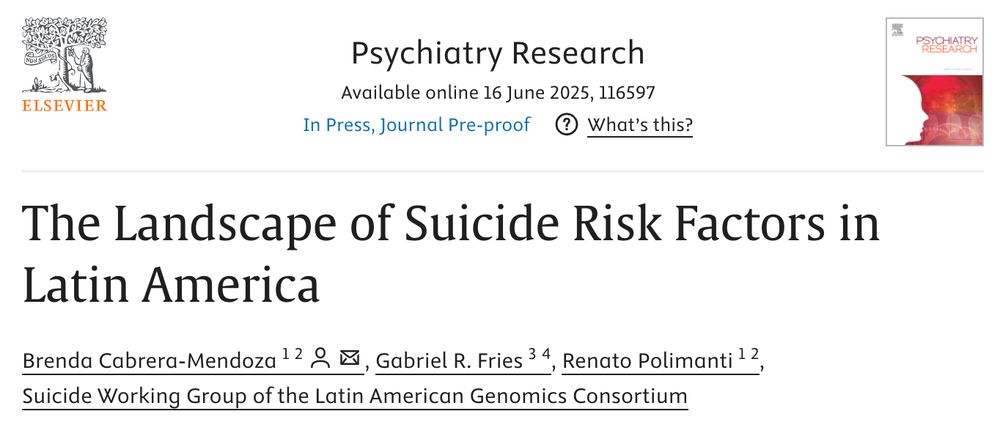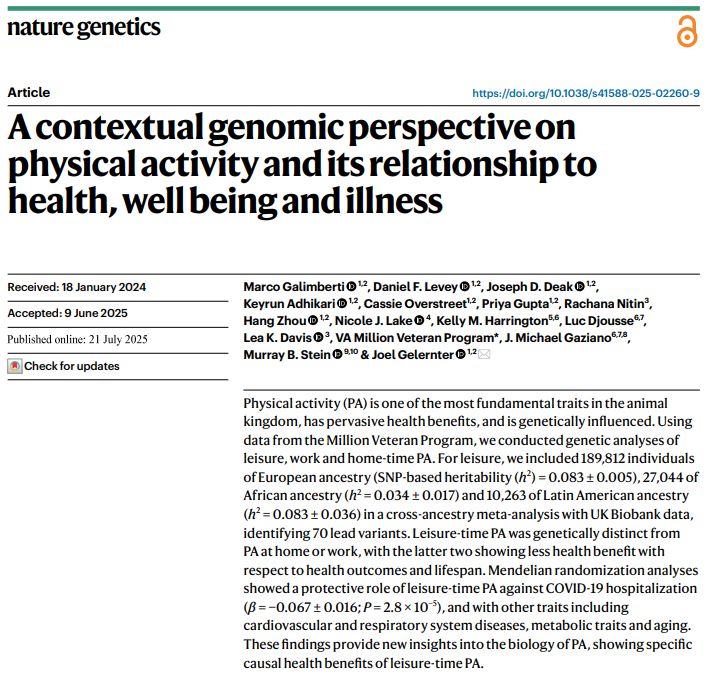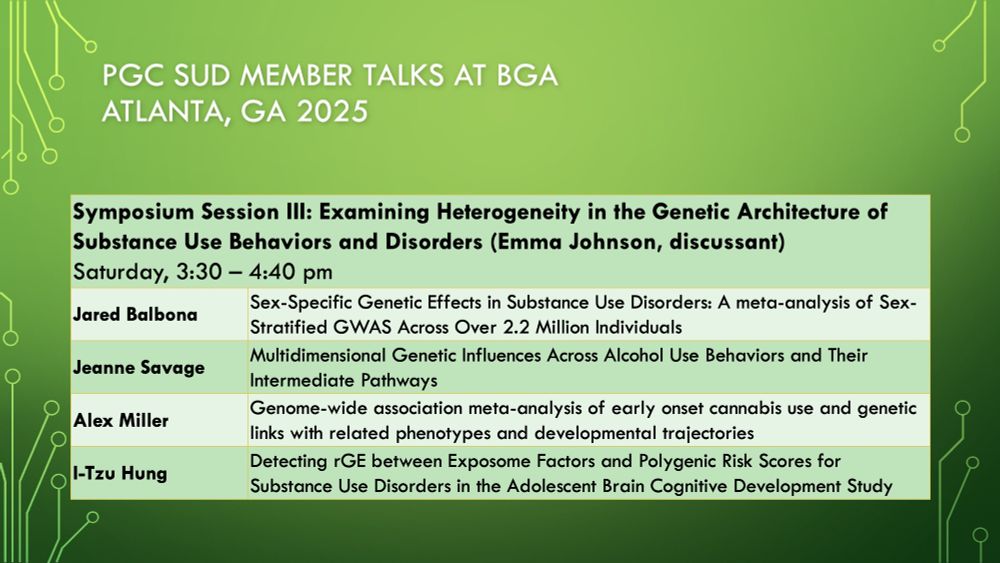
Our fourth group is the ✨Multi-level Quantitative Trait Loci✨group!
🧬AKA themQTL group🧬
🔎QTL analysis is a way to understand how genetic sequences🧬affect gene expression...
🧐Think RNA transcripts and proteins!
All these methods to understand genetics🤩
07.12.2025 15:41 — 👍 3 🔁 1 💬 0 📌 0

Next up is the awesome✨Methylation-wide association studies✨group!
AKA the MWAS group😉
#Epigenetics are changes that happen to DNA expression🧬without actually changing the sequence!
Instead, these changes happen to molecules that are attached to the DNA - how cool 🤯!
06.12.2025 17:11 — 👍 3 🔁 1 💬 0 📌 0

The second of our 5 project groups we are thrilled to introduce is the✨Isoforms✨group!
Isoforms are different versions of RNA transcripts or proteins🧬
They are a result of splicing✂️during gene expression and are an important part of how one gene can act in different ways!
05.12.2025 15:33 — 👍 2 🔁 1 💬 0 📌 0

The @fg-pgc.bsky.social is all about understanding how our genetic findings🔬translate into psychiatric conditions 🧠
We have 5 project groups, and we are excited to introduce the✨Functional Validation✨group first!
We asked them for a status update and a highlight of the year...
04.12.2025 16:43 — 👍 1 🔁 1 💬 0 📌 0
Ultimately, we:
🌟drive inclusive and diverse 'omics' mental health research,
🌟and foster a collective effort that transcends individual capabilities for global science🌎!
🧵3/3
03.12.2025 17:37 — 👍 1 🔁 0 💬 0 📌 0
We have two awesome chairs ✨@hjerling-leffler.bsky.social and @maryellenlynall.bsky.social✨, who started the group in February 2024!
We also have 5 project groups, 🔬exploring different ways of understanding #FunctionalGenomics in psychiatric disorders🧠
🧵2/3
03.12.2025 17:37 — 👍 2 🔁 0 💬 1 📌 0
So, who are the the Functional Genomics Working Group?
🎯Our goal is to understand how genes🧬, cells🦠and molecules💠contribute to psychiatric disorders🧠
We work with other PGC groups and different 'omics data (methylation, cytometry, single cell etc.) to do this🧪
🧵1/3
03.12.2025 17:37 — 👍 4 🔁 1 💬 1 📌 0


Before we get started, let’s introduce our two Social Media Reps - @natashaberthold.bsky.social and @evacschulte.bsky.social!
We're here for the #functionalgenomics🧬, and #Science #Communication📡is a🔑key part!
💫Check out their profiles💫
02.12.2025 14:35 — 👍 7 🔁 3 💬 0 📌 0
✨Welcome to the Functional Genomics Takeover of the PGC main account!✨
For the next 2 weeks @natashaberthold.bsky.social and @evacschulte.bsky.social will be taking you through the achievements and highlights of year 2 in the @fg-pgc.bsky.social.
So sit forward, get excited, and celebrate with us!
02.12.2025 14:22 — 👍 6 🔁 1 💬 0 📌 1

Congratulations to Dr. Wouter Peyrot, recipient of the 2025 Pamela Sklar Award at #WCPG2025! His innovative work continues to advance the field of psychiatric genomics. 🧬👏
29.10.2025 15:04 — 👍 9 🔁 1 💬 0 📌 0

Some recent work led by @peterjonghona.bsky.social and myself at @yaleschoolofmed.bsky.social looks at environmental, psychiatric, and genetic predictors of alcohol use disorder.
Online today at The American Journal of Psychiatry (@apapsychiatric.bsky.social):
psychiatryonline.org/doi/10.1176/...
24.09.2025 19:34 — 👍 6 🔁 3 💬 0 📌 0

Genetic and Phenotypic Features of Schizophrenia in the UK Biobank
This cross-sectional study compares genetic liability to psychiatric disorders in individuals with schizophrenia in the UK Biobank with individuals in the Psychiatric Genomics Consortium and compares ...
People with schizophrenia are underrepresented in volunteer-based biobanks. A new UK Biobank study shows that those who do participate tend to have milder symptoms, lower polygenic risk scores, lower rates of copy-number variants, and higher levels of education and employment.
24.09.2025 12:29 — 👍 2 🔁 0 💬 0 📌 0
Schizophrenia
Fact sheet on schizophrenia: key facts, symptoms, causes, support, WHO response
Schizophrenia is often misunderstood and highly complex. Learn about its prevalence and health impact in the WHO Fact Sheet 💡:
www.who.int/news-room/fa...
17.09.2025 18:03 — 👍 3 🔁 0 💬 0 📌 0
Submit data/join PGC – PGC
4/ Want to help advance schizophrenia research? 🔬You can contribute by sharing data to the newest meta-analysis via our Data Receiving Committee!
pgc.unc.edu/about-us/joi...
17.09.2025 18:02 — 👍 0 🔁 0 💬 0 📌 0
3/ The study identified 287 regions in the genome associated with schizophrenia, and follow-up analyses highlighted 120 likely involved genes.
17.09.2025 18:02 — 👍 0 🔁 0 💬 1 📌 0
1/ 🧵 For 10+ years, the Schizophrenia Working Group of the PGC has been dedicated to understanding the genetic risk factors for schizophrenia.
17.09.2025 18:02 — 👍 2 🔁 1 💬 1 📌 0
Hi from the PGC Schizophrenia working group! During the next 2 weeks, we will be posting about schizophrenia genetics and related topics. Stay tuned!
16.09.2025 16:20 — 👍 2 🔁 0 💬 0 📌 0
Today is #WorldSuicidePreventionDay.
Worried someone might be struggling with suicidal thoughts?
Your presence can be powerful. A simple check-in could be the lifeline they need. 💙
Learn more about #SuicidePrevention 👉 bit.ly/4phPYKi
10.09.2025 09:34 — 👍 242 🔁 105 💬 0 📌 8

Latin America has experienced an increase in suicide rate, contrasting with a global decline. We review possible reasons for this here: www.sciencedirect.com/science/arti...
Led by Dr. Brenda Cabrera-Mendoza and @renatopolimanti.bsky.social, 1st publication from the LAGC Suicide Working Group.
17.06.2025 12:46 — 👍 6 🔁 6 💬 0 📌 0

On 10 September, the world comes together for #WorldSuicidePreventionDay under the theme, Changing the Narrative on Suicide. This year, we’re making resources more accessible than ever - translated into more languages, to reach more communities worldwide. bit.ly/469incZ
08.09.2025 07:12 — 👍 5 🔁 2 💬 0 📌 0
Brenda Cabrera-Mendoza, postdoctoral associate at Yale Psychiatry, has been awarded a MQ US Fellow grant from MQ Mental Health Research. Her project will integrate genetic and clinical data to improve suicide risk stratification.
08.09.2025 15:42 — 👍 2 🔁 0 💬 0 📌 0
Over the next couple of tweets, we will highlight some of the funded research projects in the PGC SUI Workgroup, which are working toward understanding the genetics of suicide. #PGCSUI #suicidegenetics
08.09.2025 15:41 — 👍 0 🔁 0 💬 0 📌 0
This fall members of the PGC Suicide Workgroup will be presenting at the upcoming IASR/AFSP International Summit on Suicide Research and the World Congress of Psychiatric Genetics. We look forward to sharing our latest findings with the scientific community.
#WCPG2025 #IASR2025
04.09.2025 15:20 — 👍 0 🔁 0 💬 0 📌 0
📢 For the next two weeks, the Suicide Working Group is taking over this space.
September is Suicide Prevention Awareness Month — a time to break stigma, share resources, and highlight research and action that can save lives.
#SuicidePrevention #SuicideAwarenessMonth
04.09.2025 15:17 — 👍 0 🔁 0 💬 0 📌 0
Excited to share that our manuscript describing a multi-ancestry GWAS of nicotine dependence has now been published: doi.org/10.1017/S003...
20.08.2025 17:47 — 👍 20 🔁 4 💬 1 📌 0

"A contextual genomic perspective on physical activity and its relationship to health, well being and illness" led by Marco Galimberti at @yaleschoolofmed.bsky.social and US Dept. of Veterans Affairs is now online at Nature Genetics (@natureportfolio.nature.com)
Link: www.nature.com/articles/s41...
21.07.2025 14:20 — 👍 6 🔁 2 💬 0 📌 0
 21.06.2025 16:47 — 👍 2 🔁 1 💬 0 📌 0
21.06.2025 16:47 — 👍 2 🔁 1 💬 0 📌 0
Statistical geneticist interested in complex traits @ripkelab.bsky.social and @broadinstitute.org 🧬⚔️
Professional dungeon master @home
Assistant professor in Psychiatry at WUSM. Interested in behavioral, psychiatric, and population genetics. she/her
Lab website: https://sites.wustl.edu/emmajohnsonlab/
Join the world’s largest study on #anxiety and #depression today: gladstudy.org.uk
Research associate/assistant at IoPPN(@kingsioppn.bsky.social), KCL(@kingscollegelondon.bsky.social). Behavioural epidemiology, statistical genetics, factor analysis, machine learning.
Assistant professor at VU Amsterdam
Psychiatric genetics
PhD candidate at MPI for Psycholinguistics, Nijmegen, NL
complex trait genetics | population genetics
poetry ✨ | she/her
Postdoc in psychiatric genetics and clinical psychologist at University Hospital Bonn | PhD @ucl.ac.uk | Within-family analyses, statistical genetics, polygenic scores, behaviour genetics, epigenetics | he/him
PhD candidate Vrije Universiteit Amsterdam
Studying Autism
Postdoc at Broad Institute, Mass General Hospital, & Harvard Med
Psychiatric & Behavioral Genetics | Psychotic Disorders | Cognitive Development | Longitudinal Modeling
Chair of Behavior Genetics Association Public Science Committee
Psychiatric Geneticist interested in how biology and environment interact. Outside work I'm happiest with my little family, spending time outside and eating something spicy!
A/Prof Psychology @ VU Amsterdam; Visiting Prof @ Oslo.
Educational Genetics | Neurodiversity | Intergenerational Transmission
🧬📖➗👨👩👧👦 #ERC-StG #VIDI 🤸acrobat
https://scholar.google.com/citations?user=X2U5w7UAAAAJ&hl=nl&oi=ao
https://medicine.yale.edu/profile/joseph-deak/
Behavioral geneticist, dad, cyclist, reluctant dog owner, formerly young, allegedly irreverent, unlike most people my age, I was raised in the Great Depression.
PhD student in statistical genetics at Vrije Universiteit Amsterdam
The international Society of Psychiatric Genetics is a diverse global community committed to improving mental health by advancing and translating research and psychiatric genetics through collaboration, communication, and education.
Just a science kid researching eating disorder genetics🧬
University of North Carolina | Murdoch University | Perron Research Institute👩🏼🔬
Psychiatric Genetics Consortium🧠CEED Fellow 2022🦋Quad Fellow 2024 and Australian Senior Fellow Ambassador 2025🌏
Researcher @ SGDP Centre, KCL. Research interests in genomics, epidemiology, psychiatry, psychology, mental health


















 21.06.2025 16:47 — 👍 2 🔁 1 💬 0 📌 0
21.06.2025 16:47 — 👍 2 🔁 1 💬 0 📌 0